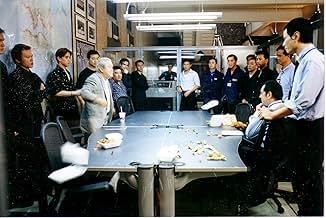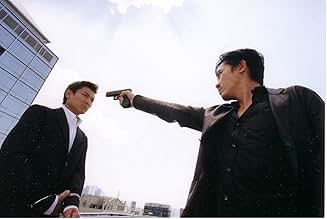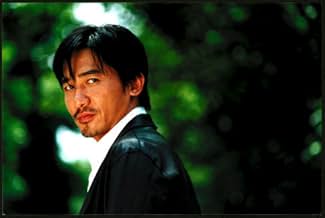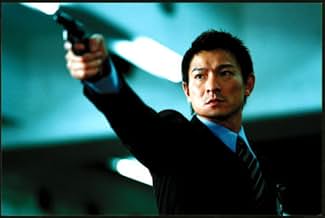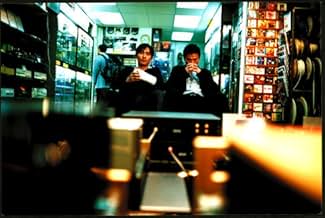Una storia tra una talpa del dipartimento di polizia e un poliziotto sotto copertura. I loro obiettivi sono gli stessi: scoprire chi è la talpa e chi è il poliziotto.Una storia tra una talpa del dipartimento di polizia e un poliziotto sotto copertura. I loro obiettivi sono gli stessi: scoprire chi è la talpa e chi è il poliziotto.Una storia tra una talpa del dipartimento di polizia e un poliziotto sotto copertura. I loro obiettivi sono gli stessi: scoprire chi è la talpa e chi è il poliziotto.
- Regia
- Sceneggiatura
- Star
- Premi
- 24 vittorie e 26 candidature totali
Tony Leung Chiu-wai
- Chen Wing Yan
- (as Tony Leung)
Anthony Chau-Sang Wong
- SP Wong Chi Shing
- (as Anthony Wong)
Ka-Tung Lam
- Inspector B
- (as Lam Ka Tung)
Ting Yip Ng
- Inspector Cheung
- (as Ng Ting Yip)
Chi-Keung Wan
- Officer Leung
- (as Wan Chi Keung)
Kam Fung Hui
- Cadet School Principal
- (as Hui Kam Fung)
Recensioni in evidenza
After I enjoyed Martin Scorcese's "The Departed, I decided to watch the film that inspired the celebrated director to re-make it and move the action from Hong Kong to Boston, MA, USA. I must say that I liked the original movie better: 50 minutes shorter than Scorcese's magnificent remake, "Infernal Affairs" is tighter, faster, more compelling and tells the same story better. It does not have a grand acting Jack Nicholson who basically plays Daryl Van Horne with the attitude and "Infernal Affairs" characters don't talk and don't curse as much as they do in "The Departed" but the Hong Kong's movie only benefits from it. As much as I admire Leonardo DiCaprio as Bill Castigan, Tony Leung (Yan) in his role is simply unforgettable.
Beautifully shot, cleverly constructed, humorous, dramatic, and humane. I never felt bored or rushed for a moment. Expect to have to concentrate on who is who, especially at the beginning, who is or might be on to whom and how, and what they might decide to do about it. Others have said that the two leads are excellent and I'm sure they're right, but I especially appreciated Eric Tsang as Sam.
It's elegant without being heartless. I felt the main characters' longing for truth in their lives, and the various different virtues, flaws, loyalties and motivations of many others too.
I was interested to see that virtually all the violence happens off-camera. It reminded me of 'authentic' productions of Classical Greek plays. Their plots often included murders, but violence was not permitted to be shown directly. A character would describe what had happened, and then a tableau of corpses would be revealed, on a wheeled wheels if I remember correctly from one production. Almost the same device is used in this film, and it's very effective when it's done well, as here.
The friend I went with would have liked to the female characters given bigger roles. Personally (I'm a woman myself, if it makes a difference) I don't care about that. I did notice, though, the way the female characters were used as symbols to represent the good and truthful side of life. It struck me, in connection with this, that sex and violence were being treated as opposites, whereas in many US films they are treated almost as two aspects of the same thing and as depending on one another, hardly existing independently. How many plots are driven by the kidnapping or other ill-treatment of the hero's wife/girlfriend/squeeze, so that the violence against her - whether she resists it violently or not - is used to justify and supposedly motivate the whole towering nonsense by virtue of her sexual relationship with the hero? It often seems that the villian's real offence is thought to be less assault on a person, than theft of property. And I wonder if, when the US remake appears, this tedious plot device will have crept in? But I digress - it was just an idea that occurred to me on the way home, and it tells you little about "Infernal Affairs", except that it may be one reason why I found this film refreshing.
An absorbing experience, and has made me more inclined to seek out Asian films in general, as well as films by the same director.
It's elegant without being heartless. I felt the main characters' longing for truth in their lives, and the various different virtues, flaws, loyalties and motivations of many others too.
I was interested to see that virtually all the violence happens off-camera. It reminded me of 'authentic' productions of Classical Greek plays. Their plots often included murders, but violence was not permitted to be shown directly. A character would describe what had happened, and then a tableau of corpses would be revealed, on a wheeled wheels if I remember correctly from one production. Almost the same device is used in this film, and it's very effective when it's done well, as here.
The friend I went with would have liked to the female characters given bigger roles. Personally (I'm a woman myself, if it makes a difference) I don't care about that. I did notice, though, the way the female characters were used as symbols to represent the good and truthful side of life. It struck me, in connection with this, that sex and violence were being treated as opposites, whereas in many US films they are treated almost as two aspects of the same thing and as depending on one another, hardly existing independently. How many plots are driven by the kidnapping or other ill-treatment of the hero's wife/girlfriend/squeeze, so that the violence against her - whether she resists it violently or not - is used to justify and supposedly motivate the whole towering nonsense by virtue of her sexual relationship with the hero? It often seems that the villian's real offence is thought to be less assault on a person, than theft of property. And I wonder if, when the US remake appears, this tedious plot device will have crept in? But I digress - it was just an idea that occurred to me on the way home, and it tells you little about "Infernal Affairs", except that it may be one reason why I found this film refreshing.
An absorbing experience, and has made me more inclined to seek out Asian films in general, as well as films by the same director.
A deceptively simple idea lies at the heart of this complex thriller: the Hong Kong police and a triad gang both have an informer in each other's organisation: whoever's man picks the enemies' spy first wins the game for his side. Add to that the customary double-agent-doesn't-know-which-side-he-is-on-anymore subplot (doubled, of course), and you have plenty of ingredients for a plot, although it's to the movie's credit that although a little stylised, it never seems false or contrived. Fast-paced and bold, with a generous score, it never insults the viewer's intelligence either, and features just the right level of moral ambiguity. At one level, it's just another thriller, and there's little in the way of wider political or social subtext; but on the other hand, it's a textbook lesson in the art of making this sort of film.
I'm late in discovering the Hong Kong crime thriller genre so I can only compare "Infernal Affairs (Mou gaan dou))" to its Hollywood compatriots. It grippingly is the equal of such intense examinations of the anguish of undercover cops as "Donnie Brascoe" or dirty cops such as "Narc" or "Training Day."
Key is the dynamic opposite pairing of two leonine, charismatic actors, Tony Leung Chiu Wai, the self-sacrificing heart throb from "Hero (Ying xiong)" and the languid lover from "In the Mood for Love (Fa yeung nin wa)" here as an antsy, anguished too long undercover cop versus Andy Lau as his crisply efficient, ambitious counterpart.
The plot, propelled as well by the music, unpredictably twists and takes hairpin turns from the beginning so that even with helpful flashbacks it's a thrilling roller coaster ride to try to follow the constantly changing loyalties, manipulations, deals and revelations, not unlike the TV series "The Wire."
Regardless, you get that the real battle is for the characters' souls as much as their lives and you hold your breath to the last surprising minute. The initial motivations for how the men came to be at this crossroads will doubtless be explored in the prequel and sequel that haven't been released in the U.S. yet.
The women are just the girlfriends, but they do have separate lives, jobs and choices that impact the men in their lives.
With noted cinematographer Christopher Doyle is listed as a "visual consultant" in the credits, the great bulk of the film takes place at night, like a comparable chase film "Collateral," so it was unfortunate that the print I saw was not pristine.
It was also annoying that the subtitles were white on white illegible and that ideograms that are shown in the scene are not translated, even when the camera rests on them for a length of time that makes one assume something significant is written there.
Key is the dynamic opposite pairing of two leonine, charismatic actors, Tony Leung Chiu Wai, the self-sacrificing heart throb from "Hero (Ying xiong)" and the languid lover from "In the Mood for Love (Fa yeung nin wa)" here as an antsy, anguished too long undercover cop versus Andy Lau as his crisply efficient, ambitious counterpart.
The plot, propelled as well by the music, unpredictably twists and takes hairpin turns from the beginning so that even with helpful flashbacks it's a thrilling roller coaster ride to try to follow the constantly changing loyalties, manipulations, deals and revelations, not unlike the TV series "The Wire."
Regardless, you get that the real battle is for the characters' souls as much as their lives and you hold your breath to the last surprising minute. The initial motivations for how the men came to be at this crossroads will doubtless be explored in the prequel and sequel that haven't been released in the U.S. yet.
The women are just the girlfriends, but they do have separate lives, jobs and choices that impact the men in their lives.
With noted cinematographer Christopher Doyle is listed as a "visual consultant" in the credits, the great bulk of the film takes place at night, like a comparable chase film "Collateral," so it was unfortunate that the print I saw was not pristine.
It was also annoying that the subtitles were white on white illegible and that ideograms that are shown in the scene are not translated, even when the camera rests on them for a length of time that makes one assume something significant is written there.
As cadets, Lau and Chan both show promise as police officers. However, Chan is removed from the training and send to be a long-term undercover in Sam's gang. However, unbeknownst to the police, Lau is also a long-term mole who is feeding information back to Sam. When Sam and police chief SP Wong both have their operations scuppered, each realises the other has a mole and sets out to uncover each. With each other's lives at risk, Lau and Chan must be the first to uncover the other.
I decided to see this after hearing good things about it but I was conscious that often foreign films can be given more leniency than Western films doing the same thing. After a slightly confusing opening few moments as characters settle down (not helped by using completely different actors for characters at late teens and late 20's - do people change that much?) the film immediately becomes gripping. The plot may well have the occasional hole and have unnecessary personal details (Lau's girlfriend and Chan's ex weren't really needed) but the central story is well written and told with such urgency that it is hard not to be totally engaged.
The film doesn't have many massive shoot outs or action scenes but it has a pretty consistent sense of tension that is enjoyable right up to a typical but impacting ending. The direction is stylish and only occasionally overuses the slow-mo jump cuts. It may owe more to American cinema than that of the Orient but it is still a very good film and I hope the inevitable remake will be as good.
The cast don't need to do that much apart from look intense and portray the tension of the story in a realistic fashion - something that they do well. At times the lead two actors are pushed out of this by the personal asides but they happily keep things on track. Both Lau and Leung play it very well - it never came down to good guy/bad guy and the audience was pretty well split. Wong is a solid officer while Tsang is good as Sam. Chen and Cheng may not have a great deal to do apart from slowing the film but they both look good doing it.
Overall this is a solidly enjoyable cop thriller, regardless of what country it comes from. It will eventually be remade I imagine and when it is I hope that it manages to retain it's consistent sense of tension, double-edged characters and a real tight hold on it's audience just as this did here.
I decided to see this after hearing good things about it but I was conscious that often foreign films can be given more leniency than Western films doing the same thing. After a slightly confusing opening few moments as characters settle down (not helped by using completely different actors for characters at late teens and late 20's - do people change that much?) the film immediately becomes gripping. The plot may well have the occasional hole and have unnecessary personal details (Lau's girlfriend and Chan's ex weren't really needed) but the central story is well written and told with such urgency that it is hard not to be totally engaged.
The film doesn't have many massive shoot outs or action scenes but it has a pretty consistent sense of tension that is enjoyable right up to a typical but impacting ending. The direction is stylish and only occasionally overuses the slow-mo jump cuts. It may owe more to American cinema than that of the Orient but it is still a very good film and I hope the inevitable remake will be as good.
The cast don't need to do that much apart from look intense and portray the tension of the story in a realistic fashion - something that they do well. At times the lead two actors are pushed out of this by the personal asides but they happily keep things on track. Both Lau and Leung play it very well - it never came down to good guy/bad guy and the audience was pretty well split. Wong is a solid officer while Tsang is good as Sam. Chen and Cheng may not have a great deal to do apart from slowing the film but they both look good doing it.
Overall this is a solidly enjoyable cop thriller, regardless of what country it comes from. It will eventually be remade I imagine and when it is I hope that it manages to retain it's consistent sense of tension, double-edged characters and a real tight hold on it's audience just as this did here.
Lo sapevi?
- QuizWhen Yan and SP Wong are waiting at the elevator, the digital floor counter skips the 4th floor. In China and Hong Kong, the number 4 is considered bad luck because it sounds similar to the word 'death'.
- BlooperShawn Yue (Young Chen Wing Yan) is taller than Anthony Chau-Sang Wong (SP Wong Chi Shing), and there is a brief shot of them standing together. Tony Chiu-Wai Leung (Chen Wing Yan) is clearly shorter than Anthony Chau-Sang Wong, so the character has apparently shrunken.
- Citazioni
Lau Kin Ming: I have no choice before, but now I want to turn over a new leaf.
Chan Wing Yan: Good. Try telling that to the judge; see what he has to say.
Lau Kin Ming: You want me dead?
Chan Wing Yan: Sorry, I'm a cop
Lau Kin Ming: Who knows that?
- Versioni alternativeFor the Chinese version an alternate ("politically correct") ending was used. In it, Lau gets arrested when he leaves the elevator.
- ConnessioniEdited into Infernal Affairs III (2003)
- Colonne sonoreInfernal Affairs
Composed & Arranged by Ronald Ng
Performed by Andy Lau and Tony Leung Chiu-wai (as Tony Leung)
Produced by Ronald Ng and Kwok-Leung Chan
O.P. BMG Music Publishing Hong Kong, Ltd./Catchy Music Publishing, Ltd.
I più visti
Accedi per valutare e creare un elenco di titoli salvati per ottenere consigli personalizzati
Dettagli
- Data di uscita
- Paese di origine
- Siti ufficiali
- Lingue
- Celebre anche come
- Vô Gian Đạo
- Luoghi delle riprese
- Ten Thousand Buddhas Monastery, Sha Tin, New Territories, Hong Kong, Cina(opening scene: temple)
- Aziende produttrici
- Vedi altri crediti dell’azienda su IMDbPro
Botteghino
- Budget
- 6.428.966 USD (previsto)
- Lordo Stati Uniti e Canada
- 169.659 USD
- Fine settimana di apertura Stati Uniti e Canada
- 25.680 USD
- 26 set 2004
- Lordo in tutto il mondo
- 8.836.958 USD
- Tempo di esecuzione1 ora 41 minuti
- Colore
- Mix di suoni
- Proporzioni
- 2.35 : 1
Contribuisci a questa pagina
Suggerisci una modifica o aggiungi i contenuti mancanti






